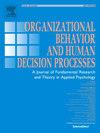When sellers care about caretakers: Seller attachment shapes who gets to the bargaining table
IF 3.8
2区 管理学
Q2 MANAGEMENT
Organizational Behavior and Human Decision Processes
Pub Date : 2025-07-01
DOI:10.1016/j.obhdp.2025.104420
引用次数: 0
Abstract
Negotiation research has often emphasized the active bargaining phase (including offers, concessions, and settlements), paying less attention to the preceding processes that bring parties together. This paper investigates how sellers’ emotional attachment to their possessions influences the negotiation “sales funnel”—the process through which sellers engage and sort through the field of potential buyers to determine which ones “get to the table” and to whom they ultimately sell. We propose that sellers with higher attachment assign greater importance to a buyer’s caretaking attributes (e.g., intentions to care for and preserve the possession) and devote more time and effort to seeking out such buyers. Across four preregistered studies involving over 1,500 participants, we examined whether attachment led to such “caretaker effects” in real-world transactions and a controlled experiment. Study 1 surveyed recent sellers from online marketplaces, finding that those with higher attachment invested more effort in vetting buyers and weighing buyer caretaking attributes more heavily in their decisions. Studies 2 and 3 examined home sales, with surveys of recent home sellers and real estate agents replicating the caretaker effects in high-stakes transactions. Study 4 experimentally manipulated seller attachment in a novel simulated inbox paradigm, establishing a causal link between attachment and search/engagement behavior. Together, our findings go beyond the traditional emphasis of “how much” in negotiation research to focus instead on the “who,” demonstrating that seller attachment shapes the negotiation process by influencing how sellers search for, engage with, and select potential buyers.
当卖家关心照顾者时:卖家依恋决定了谁能走到谈判桌上
谈判研究通常强调积极的谈判阶段(包括提议、让步和和解),而较少关注将各方聚集在一起的先前过程。本文研究了卖家对其财产的情感依恋如何影响谈判的“销售漏斗”——卖家与潜在买家接触并对其进行分类,以确定哪些买家“坐到谈判桌前”,以及最终卖给谁的过程。我们建议,具有较高依附关系的卖方更重视买方的照料属性(例如,照料和保存该物的意图),并投入更多的时间和精力来寻找这样的买方。在涉及1500多名参与者的四项预注册研究中,我们研究了依恋是否会在现实世界的交易和对照实验中导致这种“看护效应”。研究1调查了最近在线市场上的卖家,发现那些依恋程度较高的卖家在审查买家上投入了更多的精力,并在决定时更看重买家的照顾属性。研究2和研究3对房屋销售进行了调查,对最近的房屋卖家和房地产经纪人进行了调查,重现了高风险交易中的看门人效应。研究4在一个新颖的模拟收件箱范例中实验操纵卖方依恋,建立依恋与搜索/参与行为之间的因果关系。总之,我们的研究结果超越了谈判研究中传统的“多少”的重点,而是关注“谁”,表明卖方依恋通过影响卖方如何搜索、接触和选择潜在买家来塑造谈判过程。
本文章由计算机程序翻译,如有差异,请以英文原文为准。
求助全文
约1分钟内获得全文
求助全文
来源期刊
CiteScore
8.90
自引率
4.30%
发文量
68
期刊介绍:
Organizational Behavior and Human Decision Processes publishes fundamental research in organizational behavior, organizational psychology, and human cognition, judgment, and decision-making. The journal features articles that present original empirical research, theory development, meta-analysis, and methodological advancements relevant to the substantive domains served by the journal. Topics covered by the journal include perception, cognition, judgment, attitudes, emotion, well-being, motivation, choice, and performance. We are interested in articles that investigate these topics as they pertain to individuals, dyads, groups, and other social collectives. For each topic, we place a premium on articles that make fundamental and substantial contributions to understanding psychological processes relevant to human attitudes, cognitions, and behavior in organizations. In order to be considered for publication in OBHDP a manuscript has to include the following: 1.Demonstrate an interesting behavioral/psychological phenomenon 2.Make a significant theoretical and empirical contribution to the existing literature 3.Identify and test the underlying psychological mechanism for the newly discovered behavioral/psychological phenomenon 4.Have practical implications in organizational context

 求助内容:
求助内容: 应助结果提醒方式:
应助结果提醒方式:


